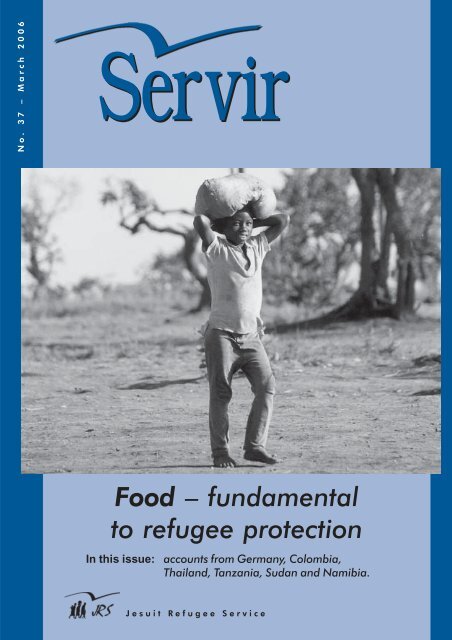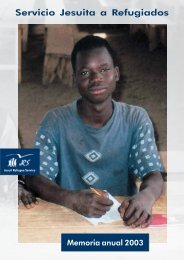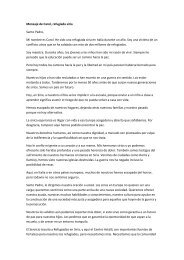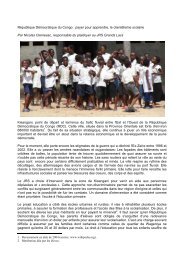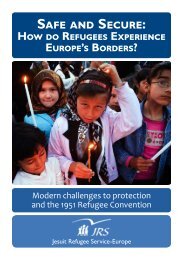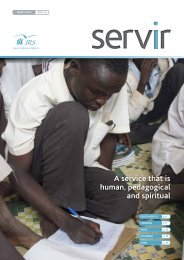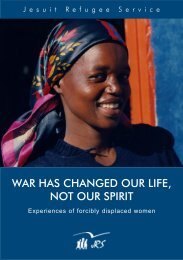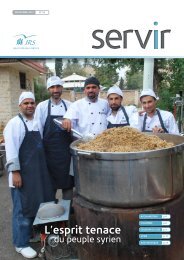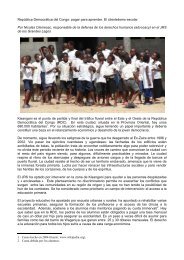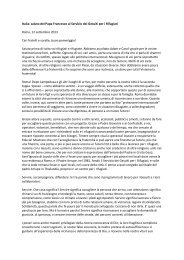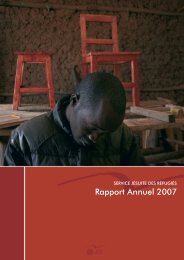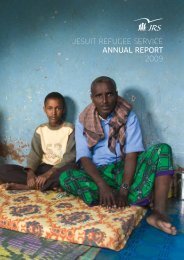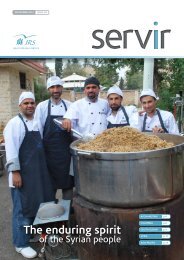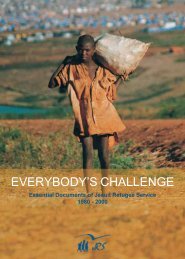You also want an ePaper? Increase the reach of your titles
YUMPU automatically turns print PDFs into web optimized ePapers that Google loves.
No. 37 – March 2006<br />
Servir<br />
Food – fundamental<br />
to refugee protection<br />
In this issue:<br />
accounts from Germany, Colombia,<br />
Thailand, Tanzania, Sudan and Namibia.<br />
Jesuit Refugee Service<br />
SERVIR No. 37 – March 2006 1
EDITORIAL<br />
Self-reliance, yes!<br />
But not through food cuts<br />
Lluís Magriñà SJ<br />
Breakdowns in food supply oblige<br />
forced migrants to make choices<br />
which have a negative impact<br />
their lives. This Servir examines the<br />
issue of food security for refugees and<br />
other forced migrants. In many cases,<br />
difficulties accessing food are institutional.<br />
States and the international community<br />
in general have abandoned them<br />
to fend for themselves, without giving<br />
them the right to farm land or to work.<br />
<strong>JRS</strong> runs projects and advocacy campaigns<br />
that mitigate the effects of these<br />
policies; but it’s not enough when the<br />
focus of beneficiaries is their survival.<br />
Refugee kitchen, Venezuelan-Colombian<br />
Mr Keßler describes the situation of Ali,<br />
caught in a dispute between two states.<br />
He is unable to obtain food and shelter<br />
without a residence permit. To receive<br />
one, he must have a travel document,<br />
which was denied to him without a residence<br />
permit. This is not simply a bureaucratic<br />
mistake. Germany, like other<br />
industrialised states, is adopting new policies<br />
to deter refugees from coming and<br />
is using lack of access to sufficient food<br />
as part of this deterrence policy.<br />
Mr Bustillo explains how if it were not<br />
for the assistance provided by friends,<br />
family and organisations like <strong>JRS</strong>, survival<br />
for many internally displaced persons<br />
(IDPs) in Colombia would be in<br />
question. The situation is complex. The<br />
Colombian government is charged with<br />
protecting IDPs but is also responsible<br />
for causing their displacement, for denying<br />
them sufficient support while displaced<br />
and for encouraging their return<br />
to unsafe areas.<br />
Ms den Otter examines recent changes<br />
in UNHCR, the UN refugee agency,<br />
policy towards refugees in Thailand.<br />
The agency promotes refugee self-re-<br />
liance, but the Thai government does<br />
not permit refugees to work. UNHCR<br />
is facing cuts to its budget, and has cut<br />
the assistance provided to refugees.<br />
The fortunate find work in the informal<br />
labour market where they risk government<br />
sanctions and exploitation at<br />
the hands of unscrupulous employers.<br />
Others, in particular children, survive<br />
as best they can.<br />
In Tanzania, Ms Le highlights the contradictions<br />
in national and international<br />
policy towards refugees. The Burundian<br />
refugees she describes depend<br />
almost entirely on the UN World Food<br />
Programme for survival. Insufficient<br />
rations force them to work illegally. After<br />
12 years, they have had enough and<br />
some are prepared to risk life at home.<br />
Of course rations should be increased<br />
but, more than that, they should be allowed<br />
to work and contribute to the<br />
development of the local economy.<br />
The consequences of inaction are<br />
clearly illustrated by Ms Kerrigan and<br />
Sr Whitaker. It is the most vulnerable<br />
who pay. Food insecurity prevents children<br />
from going to school. They are<br />
forced to work to support the family.<br />
Those at school are often unable to<br />
concentrate and learn more slowly.<br />
These are only a few examples of the<br />
terrible effects that policies, deliberate<br />
or not, have on forcibly displaced persons<br />
the world over. Food shortages<br />
can be the cause of family breakdown<br />
and malnutrition, particularly for children<br />
whose physical and psychological<br />
development can be seriously affected.<br />
This is why we pray in the Our<br />
Father: Give us this day our daily bread.<br />
Lluís Magriñà SJ, <strong>JRS</strong><br />
International Director<br />
2
Hunger and homelessness<br />
regulated by law<br />
GERMANY<br />
Stefan Keßler<br />
According to the latest UN Human Development Report,<br />
Germany is one of the richest countries in the<br />
world. Despite this, many people are hungry and<br />
homeless. For some, food and shelter are denied by law.<br />
One such person is Ali Mansour (not his real name). In the<br />
summer of 2003, the 23-year old Palestinian refugee came<br />
to Germany from Lebanon. In Berlin, he applied for residency,<br />
but his request was denied. Nevertheless, he could<br />
not be deported because he could not acquire proper documentation.<br />
The Lebanese authorities usually refuse to issue<br />
travel documents, essential for deportation, to Palestinians<br />
not in possession of a German residence permit.<br />
The official name given to Ali’s status is Duldung, or tolerated.<br />
As stated in the report by the Independent Commission<br />
on Immigration, established by the German Federal Minister<br />
of the Interior and headed by a former President of the German<br />
Federal Parliament, Prof. Dr. Rita Sueßmuth: the<br />
“Duldung is not a residence permit but a temporary suspension<br />
of deportation... Hence, it does not constitute a legal stay<br />
but exempts the illegal stay from being a criminal offence”.<br />
Fortunately, the Berlin regional government has promised<br />
to issue a new decree which would allow persons like Ali<br />
to receive at least food and shelter. However, it cannot be<br />
certain that the promised decree will offer tolerated persons<br />
sufficient food and shelter or that it will provide other<br />
necessities such as clothing and medical assistance.<br />
Ali’s fate is far from exceptional. <strong>JRS</strong> Germany deals with<br />
many cases where individuals fleeing human rights abuses,<br />
receive reduced support or, as in Ali Mansour’s case, nothing<br />
but homelessness and hunger regulated by the law.<br />
Stefan Keßler,<br />
Legal Officer, <strong>JRS</strong> Germany<br />
Low-cost supermarket, Germany<br />
When Ali applied for residency in 2003, he had no money<br />
and was refused a residence permit and consequently the<br />
right to undertake employment. The immigration office told<br />
Ali he needed a Lebanese passport in order to receive food<br />
and shelter until his deportation. The Lebanese embassy<br />
told him because he was Palestinian, he could not receive a<br />
passport unless he had a German residence permit.<br />
Without a residence permit, he was denied a passport, and<br />
without a passport the social security department refused<br />
to give him financial or any other form of support. Without<br />
his friends who provided shelter and shared what little they<br />
had with him, Ali Mansour would be living on the streets.<br />
<strong>JRS</strong> Germany assisted Ali to contest the decision to deny<br />
him basic assistance, but the court upheld the refusal. The<br />
relevant provisions are found in the German asylum seekers’<br />
social benefits act (Asylbewerberleistungsgesetz). The<br />
act also regulates social benefits to ‘tolerated’ non-nationals.<br />
According to the act, certain groups of non-nationals<br />
should receive 20 percent less than what is normally paid to<br />
Germans. In addition, article 1a of the act allows this assistance<br />
to be reduced to a minimum of what is absolutely<br />
necessary to survive.<br />
SERVIR No. 37 – March 2006<br />
3
COLOMBIA<br />
Colombian<br />
refugee,<br />
Venezuela<br />
Juan Manuel Bustillo<br />
Forced home<br />
but not protected<br />
When the local population is not<br />
being attacked by armed groups<br />
or by the army, it is being harmed<br />
by the government trying to spray the coca<br />
plants with poisonous acid. In response,<br />
many flee to what they consider safer areas.<br />
In the last three years alone, more than<br />
three million people, as much as 5 percent<br />
of Colombia’s population, have been forcibly<br />
displaced because of the country’s armed<br />
conflict. More than half of all displaced persons<br />
are children under the age of eighteen.<br />
While Colombia is among a handful of countries<br />
that has enacted legislation to protect<br />
internally displaced persons (IDPs); nonetheless,<br />
they are often not provided with<br />
food assistance. In 2003, nearly a quarter<br />
of displaced children were at risk of malnutrition,<br />
those between the ages of one and<br />
two years being the most affected.<br />
Governmental assistance, when granted, is<br />
limited and only granted to those officially<br />
registered as displaced. The process of registering<br />
and requesting humanitarian assistance<br />
takes many months. Assistance is<br />
normally provided for three months up to a<br />
maximum of six. After the three month<br />
period ends, most IDPs do not receive any<br />
further humanitarian assistance.<br />
Unable to get by, IDPs often feel forced to<br />
return home due to a lack of other options.<br />
The state assistance they receive when they<br />
return is better than what they receive as<br />
IDPs, but is still inadequate. Food support is<br />
only provided for a maximum of 60 days. Each<br />
family also receives approximately 157 USD<br />
per month, which is not sufficient to pay for<br />
food until the end of the harvesting season.<br />
Returning home also means returning to<br />
unsafe areas where daily life is threatened<br />
by fighting, and coca plant spraying. Because<br />
return is seen as the only valid option,<br />
integration into safer areas is effectively<br />
discouraged. Despite the danger, the<br />
Colombian government’s National Development<br />
Plan 2002-2006 seeks to persuade<br />
30,000 displaced families to return to their<br />
home areas. Government guidelines indicate<br />
the social and economic costs of displacement<br />
are reduced the quicker the decision<br />
to return home is made.<br />
Once home, many people find their freedom<br />
of movement restricted. In effect, prevents<br />
them from accessing food and healthcare.<br />
It also jeopardises their safety. In 2004, at<br />
least 70 villages throughout the country were<br />
threatened by the practices of the paramilitary<br />
and insurgent groups. However, state<br />
4
security forces have also been accused of<br />
restricting the movement of the inhabitants<br />
of towns and villages throughout Colombia,<br />
allegedly to prevent them from assisting<br />
paramilitary and insurgent groups.<br />
As a result of fighting between paramilitary,<br />
insurgent and military groups, on 1 May,<br />
42 families from Cerro Azul in northern<br />
Colombia were forcibly displaced. An 18-<br />
month old baby girl was killed and her father<br />
wounded during the clash. Residents<br />
fled. Shortly afterwards they were encouraged<br />
to return to Cerro Azul with the promise<br />
of state support for three months, however,<br />
only one food assistance package was<br />
provided to each returnee family.<br />
On 20 August, the Colombian government<br />
decided to spray the coca fields with glyphosate,<br />
a poisonous acid. It burns and dries<br />
everything it comes in contact with. One<br />
coca field located near a school was sprayed<br />
by light aircraft. The wind carried the glyphosate<br />
towards the school, burning the skin<br />
of several children. The school’s garden<br />
plants were also burned. Since they are<br />
afraid of being attacked by paramilitary<br />
groups, the pilots are not careful about<br />
where they spray. At times, they do not<br />
even spray the coca plants. Instead, they<br />
spray houses, people and animals.<br />
Consequently, the subsistence crops in the<br />
area were badly damaged. Food shortages<br />
and economic hardship followed. Failure by<br />
the authorities to provide food and support<br />
to the local population caused further displacement.<br />
With this knowledge in hand, the Colombian<br />
government has repeatedly failed to<br />
take action. In 2004, UNHCR, the UN<br />
refugee agency, urged the Colombian government<br />
not to make humanitarian assistance<br />
subject to budgetary availability and<br />
to allocate the necessary resources to prevent<br />
forced displacement. In the same year,<br />
Colombia’s Constitutional Court held that<br />
the government’s system for assisting displaced<br />
persons was unconstitutional. It declared<br />
the state had an obligation to provide<br />
humanitarian assistance to those IDPs not<br />
in a position to sustain themselves. In September<br />
2005, the Court found the steps<br />
taken by the government to comply with its<br />
ruling were insufficient in terms of both resources<br />
and institutional will.<br />
Nevertheless, the process of assisting IDPs<br />
continues to be overly bureaucratic, lack<br />
transparency and ignore persons awaiting<br />
official registration. It is evident that the decision<br />
to return is not voluntary. Displaced<br />
persons lack information regarding the security<br />
situation in their home areas. They presume<br />
the government will provide socio-economic<br />
support for their long-term security<br />
needs. Displaced persons are regularly faced<br />
with a choice between hunger and going<br />
home, even though return may mean living<br />
where there are minefields, a constant threat<br />
of armed attack, forced recruitment of children,<br />
and insufficient assistance from human<br />
rights organisations. Although they are not<br />
guaranteed any financial support at home,<br />
social and family ties, as well as organisations<br />
like <strong>JRS</strong> in Cerro Azul, make surviving<br />
from week to week somehow possible.<br />
Juan Manuel Bustillo,<br />
Advocacy Officer,<br />
<strong>JRS</strong> Colombia<br />
Maize,<br />
a staple<br />
part of the<br />
Colombian<br />
diet<br />
Returned IDP,<br />
Colombia<br />
SERVIR No. 37 – March 2006 5
THAILAND<br />
Struggling<br />
Vera den Otter<br />
Life for Xiong Pa (not his real name),<br />
a Laotian refugee, is not easy. His family,<br />
he says, does not have enough<br />
food to eat breakfast everyday. The rest of<br />
the time they usually just eat rice.<br />
He recalls, “we asked the Bangkok Refugee<br />
Centre (BRC, a local NGO partner of<br />
UNHCR, the UN refugee agency) to give<br />
us some money, as the subsistence allowance<br />
they give us is not enough to buy food.<br />
Of the 3,500 baht (approximately 70 euros)<br />
my brother and I are given, 2,500 goes on<br />
rent, the other 1,000 baht is spent on things<br />
like soap, transport and the like. We cannot<br />
afford to spend it on food. The last 10 days<br />
of the month are the worst, the money runs<br />
out quickly, and we have to skip more meals.<br />
Since we don’t have money for clothes, we<br />
go to <strong>JRS</strong> and they give us some”.<br />
Xiong’s kitchen<br />
Xiong’s living room<br />
Xiong Pa lives in a crowded room with eight<br />
other family members: three of his brothers<br />
and their wives and children. The children<br />
do not get the variety of food they so<br />
need while growing up. Like Xiong, the two<br />
eldest, 12 and 15 years old, only eat two<br />
meals of plain rice per day. They have<br />
learned to live with it and do not complain.<br />
His younger nephew though, cries day and<br />
night of hunger, but all the family can give<br />
him is some rice soup with a bit of sugar.<br />
Xiong says his family is lucky because they<br />
live above a restaurant owned by their landlord.<br />
Sometimes they are able to receive<br />
food other than rice in exchange for work.<br />
They also have relatives who occasionally<br />
give them a little extra money when it can<br />
be spared. He knows at least 10 other families<br />
who receive nothing extra and suffer<br />
much more than his does.<br />
Before the subsistence allowances were cut<br />
by 30 percent on 31 August 2005, UNHCR<br />
gave him and his brother 5,400 baht. Xiong<br />
says his life was okay then; he could buy<br />
food and sometimes clothes. When he first<br />
heard UNHCR was going to cut the subsistence<br />
allowance, he was hoping they<br />
6
THAILAND<br />
to get by in a big city<br />
would help him find work, and it would not<br />
be so bad. For nearly four months he heard<br />
nothing, until last December when someone<br />
from BRC came to interview him.<br />
Xiong told him he would like to work at<br />
home, but he has not heard from them since.<br />
<strong>Now</strong>, there are rumours that UNHCR will<br />
completely cut refugee assistance in 2006.<br />
Xiong cannot find work and does not know<br />
what to do. Naturally, it makes him worry<br />
about his family and others in the same predicament.<br />
“Some families I know have 13 children.<br />
They will really suffer if they can’t get financial<br />
assistance. Where are they going<br />
to live? What will they eat?”<br />
ures, and commits the organisation to providing<br />
food and shelter assistance in order<br />
to meet the basic needs of refugees.<br />
<strong>JRS</strong> Thailand is aware of studies undertaken<br />
on the impact of UNHCR self-reliance<br />
strategies on refugees in New Delhi,<br />
Cairo and Moscow, yet, no such study has<br />
been done in Thailand. Similar in-depth<br />
knowledge of refugees in Bangkok and<br />
other urban areas hosting refugees in Thailand<br />
are simply not available. However,<br />
anecdotal evidence of the effects on <strong>JRS</strong>’<br />
clients is extremely worrying.<br />
The Thai government is not a signatory to<br />
the 1951 UN Refugee Convention. As such,<br />
refugees recognised by UNHCR do not<br />
have legal status in Thailand or the right to<br />
work. Bangkok, an increasingly expensive<br />
middle-income developing city, offers few<br />
opportunities for refugees to earn a living.<br />
Most are not optimistic about the future.<br />
After the allowances were cut, many refugees<br />
frantically began looking for food.<br />
They turned to <strong>JRS</strong> for assistance, particularly<br />
Cambodians and Laotians with large<br />
families. African refugees, for whom it is<br />
even more difficult to find a job in the informal<br />
labour market, desperately sought<br />
to be resettled to a third country. The <strong>JRS</strong><br />
urban refugee programme, established to<br />
assist asylum seekers, responded as best<br />
as it could to the dire situation faced by<br />
many refugees.<br />
One of the official reasons that assistance<br />
to refugees was cut, was to promote selfsufficiency;<br />
an unlikely outcome given that<br />
refugees are prohibited from undertaking<br />
paid employment in the formal labour market.<br />
In response to the dire circumstances<br />
many refugees faced, UNHCR seems to<br />
have reversed its stance. A draft of its revised<br />
policy acknowledges the previous fail-<br />
At the moment, support provided under the<br />
UNHCR Thailand urban refugee programme<br />
is insufficient. If the large budget<br />
cuts announced for 2006 are implemented,<br />
it seems inevitable that further cuts in refugee<br />
subsistence allowances will have to be<br />
implemented. If denied sufficient income<br />
to pay for basic necessities, as in Xiong Pa’s<br />
case, refugees risk being forced to reduce<br />
the amount and quality of food they consume.<br />
Of course, vulnerable refugees, especially<br />
children, will be hit the hardest.<br />
Vera den Otter, Information/<br />
Advocacy Officer, <strong>JRS</strong> Thailand<br />
Laotian<br />
refugee<br />
children in<br />
Thailand<br />
SERVIR No. 37 – March 2006 7
TANZANIA<br />
Between<br />
hunger<br />
and home<br />
Refugee<br />
woman<br />
collecting<br />
firewood<br />
Minh-Chau Le<br />
Agroup of Burundian refugee women<br />
patiently wait for their group leader<br />
to present their ration cards and<br />
collect the sacks of food. In the camps in<br />
northwestern Tanzania, refugees do not<br />
collect their rations individually. On each<br />
street, they are grouped by family size.<br />
Typically, when the leader receives all the<br />
food, the group members assist him, carrying<br />
the sacks and containers out of the<br />
fenced-in area to divide the food.<br />
Busy hands pour oil into individual containers,<br />
measure cups of maize grain and tie sacks of<br />
beans. After collecting her rations, Gloriose<br />
(not her real name) steps away from the group<br />
to balance her family’s 34kg of maize grain<br />
on her head. With an oil can in one hand, and<br />
her 16-month old baby tied to her back, she<br />
leads her 9-year old daughter, Jackie (not her<br />
real name) back to their mud-brick home.<br />
Jackie walks slowly, burdened by 10kg of<br />
beans and porridge flour perched on her head.<br />
Every two weeks, on distribution day, she has<br />
to take the day off school in order to help her<br />
mother. “I don’t mind the weight,” Gloriose<br />
grins, “I wish it was heavier, much heavier!”<br />
When Gloriose’s family receives their full<br />
ration allowance, it still amounts to less than<br />
the recommended minimum of 2,100 calories<br />
per person per day. Even the UN<br />
agency, the World Food Programme (WFP)<br />
acknowledges that people cannot be expected<br />
to survive on such a limited diet.<br />
Tanzanian law and policy prohibits refugees<br />
in these camps from working, undertaking<br />
any form of business activities or being more<br />
than four km away from the camps. It is<br />
essentially impossible for a refugee to abide<br />
by these laws. Not provided with firewood<br />
to cook their rations, they must risk arrest,<br />
police abuse, assault and even rape as punishment<br />
for simply leaving the camps to collect<br />
it, or buying it from those who do. In<br />
addition, the maize grain provided, a main<br />
staple of their limited diet, is not in an edible<br />
form; it must be milled into maize flour.<br />
Gloriose can only feed her family by spending<br />
about 2,500 shillings, just over two euros,<br />
on firewood and 700 shillings to mill the<br />
grain every two weeks. To do this, a refugee<br />
without income would be forced to sell<br />
8
TANZANIA<br />
some rations. Oil is the first thing to be sold,<br />
and Gloriose could get 1,200 shillings for<br />
her ration of oil. For the remaining 2,000<br />
shillings she would have to sell approximately<br />
10kg of her maize flour.<br />
If Gloriose did this, it would be literally impossible<br />
to survive on that amount of food.<br />
Therefore, Gloriose’s family breaks Tanzanian<br />
law on a regular basis. Her husband<br />
works for local Tanzanian farmers and receives<br />
600 shillings per day. Though the<br />
income is less than 10 euros per month, it is<br />
enough to buy the firewood and pay for<br />
milling the maize.<br />
Occasionally, she will also venture up to 10km<br />
outside of the camp to collect wood, especially<br />
when the family needs to save money<br />
to buy clothes, furniture or pay school fees.<br />
The money also buys onions and tomatoes<br />
for the bean stew her family eats almost daily,<br />
as well as some cassava and bananas, which<br />
the family enjoys for variety.<br />
“They expect us to eat boiled beans and ugali<br />
(maize bread) every day, sometimes without<br />
even salt. Could you do that for 12<br />
years?” Breaking the law is the only way to<br />
survive. But recently, Gloriose and her husband<br />
have considered another way. “Things<br />
are becoming unbearable,” she shakes her<br />
head. “The camp is insecure. Children die<br />
from malaria. And the rations go up and<br />
down, but we are the last to know”. Her<br />
husband, Zenon (not his real name), interrupts,<br />
“maybe we must leave the camp, and<br />
go back to Burundi”.<br />
Though some families are able to save considerable<br />
amounts of money, food, rent and<br />
are even able to cultivate land outside the<br />
camp, Gloriose’s family survives from food<br />
distribution to food distribution. They have no<br />
insurance for periods when rations are cut.<br />
In 2005, when rations were cut to only 67<br />
percent of the norm, Gloriose says, “we borrowed<br />
money for food. I went to collect firewood<br />
everyday to sell it. It was a bad time”.<br />
Though rations have since stabilised, they<br />
remain unreliable. For refugees like Gloriose,<br />
food insecurity is a push factor. Though repatriation<br />
should be completely voluntary,<br />
insufficient rations force refugees to consider<br />
going home as a survival technique,<br />
not a choice. One of Gloriose’s neighbours<br />
commented: “It is better to return and die<br />
from a gunshot than being threatened to<br />
death by hunger...” Inadequate rations<br />
threaten refugees in ways much more complicated<br />
than just calories. Community service<br />
officials in the camps have informed <strong>JRS</strong><br />
staff that stress caused from inadequate<br />
rations increases the likelihood of domestic<br />
violence and abuse.<br />
Better ration levels from WFP would certainly<br />
help the situation, but it is still a solution<br />
that would leave Gloriose and her family<br />
at the mercy of others. Refugee leaders<br />
agree the best solution would be to allow<br />
refugees to work and start businesses and<br />
become self-sufficient. This would avoid<br />
over dependence on international food aid,<br />
which has never been very reliable.<br />
Minh-Chau Le, Public<br />
Relations Officer, Radio<br />
Kwizera, <strong>JRS</strong> Tanzania<br />
Refugee child<br />
collecting food<br />
SERVIR No. 37 – March 2006 9
SUDAN<br />
Food or<br />
Emer Kerrigan<br />
Gulu,<br />
northern<br />
Uganda,<br />
near Sudan<br />
Lobone, seven kilometres from the northern<br />
Uganda border, is now home to many<br />
displaced communities from the recently<br />
ended 21-year-long war between the<br />
Sudan People’s Liberation Movement/Army<br />
and the government of Sudan.<br />
The 1994 war displaced many Dinka people<br />
south to Lobone. As many as four-fifths of<br />
the 33,000 internally displaced persons (IDPs)<br />
in Lobone are Dinka. Families were forced to<br />
leave their cattle behind and turn to crop cultivation<br />
as the main source of food. Inadequate<br />
farming methods and an over-reliance on three<br />
crops has had a damaging effect on the nutrition<br />
of the community. Malnutrition rates have<br />
risen causing children to be regularly admitted<br />
to the local hospital and mothers to miss adult<br />
literacy classes to take care of sick relatives.<br />
In 2001, <strong>JRS</strong> began providing communities with<br />
education and pastoral services, including guidance,<br />
schools materials and financial support<br />
to teachers. Consequently, education has flourished<br />
in the area in recent years. Standards rise<br />
annually and currently Lobone accommodates<br />
seven primary schools, one secondary school,<br />
11 nursery schools and nine adult literacy centres,<br />
with a student population of nearly 8,000.<br />
Despite an abundance of fertile land in Lobone<br />
and the increasing availability of education,<br />
food insecurity remains a threat to the community.<br />
It affects all aspects of education, influencing<br />
the attendance of adults and children<br />
and the intellectual development of children.<br />
The vast majority of people in the area survive<br />
directly on what they grow; few individuals<br />
have the training or education to earn<br />
an income elsewhere. Cultivation and harvesting<br />
seasons are crucial to the survival of<br />
the family. During these periods, children and<br />
mothers, who form the vast majority of adult<br />
learners, stay off school to work. Moreover,<br />
between May and July, school attendance is<br />
also poor as food runs short in the community<br />
and the students are forced to go to<br />
Uganda in search of food.<br />
One means of addressing food insecurity is<br />
through the school meals programme facilitated<br />
jointly by Catholic Relief Services and<br />
<strong>JRS</strong>. The programme encourages the children<br />
to stay in school until the lunch hour and provides<br />
them with nutrition which may not be<br />
available at home. This food is crucial to their<br />
cognitive development and contributes to the<br />
improvement in the children’s attention span.<br />
Many of the students are orphans and reside<br />
with extended families. Providing their own<br />
lunches to take to school would place an excessive<br />
strain on their extended families.<br />
Nevertheless, the delivery of food is occasionally<br />
delayed. Food can only be transported<br />
on one road from Uganda which is<br />
frequently attacked by the Ugandan rebel<br />
group, the Lord’s Resistance Army. Due to<br />
the attacks, school attendance is immediately<br />
affected, often decreasing by as much as<br />
three quarters.<br />
The future of education of the internally displaced<br />
community in Lobone is entirely dependent<br />
on the food security in the area.<br />
Although education is valued for its long-term<br />
benefits, it is the basic and immediate need<br />
of food that is the most influential determinant<br />
to the success of the education programme<br />
in Lobone.<br />
Emer Kerrigan,<br />
Administrator,<br />
<strong>JRS</strong> Sudan<br />
10
NAMIBIA<br />
school<br />
Joanne Whitaker RSM<br />
Osire Refugee Camp, central Namibia,<br />
is home to about 23,000 refugees,<br />
mostly Angolans. One day during<br />
the school year, our <strong>JRS</strong> team made its usual<br />
visit. It was late morning when we arrived<br />
and went directly to the primary school. We<br />
discovered many of the children were absent.<br />
Most were standing in the queue to receive<br />
their monthly food rations or assisting<br />
their families and others to collect their rations.<br />
Those who were not in the queue were<br />
busy working, transporting heavy loads of<br />
maize or cooking oil from the distribution point<br />
back to the camp. Distribution usually occurrs<br />
once a month, but often more.<br />
to ask for assistance and set up a project for<br />
girls between the ages of 10 to 20 called the<br />
Osire Girls Club. The purpose of the club was<br />
to help girls stay in school by offering extracurricular<br />
activities, including some supplemental<br />
food supplies which could be taken to<br />
their families. These efforts, while not completely<br />
successful, did significantly reduce<br />
girls’ absence and withdrawal from school.<br />
We felt powerless. Families needed assistance.<br />
Many students used the opportunity to<br />
supplement their rations. We needed to face<br />
reality and to plan lessons and exams for days<br />
when the children would not be needed to<br />
collect the food.<br />
An even more disturbing reality was the complete<br />
withdrawal of children from school, especially<br />
girls, to assist the family in getting<br />
food. They would work in the family’s garden<br />
or stay at home to take care of younger<br />
children while the adults looked for work on<br />
nearby farms or wherever they could find<br />
some temporary work. Work outside the camp<br />
often created problems for the refugees. The<br />
government did not allow refugees to work.<br />
In some cases, farmers would not pay the<br />
refugees and tell them to get off their farm or<br />
they would report them to the police for trespassing<br />
and stealing their cattle. Girls, especially<br />
those alone in the camp without parents,<br />
would sometimes end up being sexually exploited<br />
for money. In fact, this even happened<br />
to girls with parents. The parents would be<br />
forced to accept their daughter’s prostitution<br />
out of desperation. Once this started, the girls<br />
almost never returned to school.<br />
Again, finding an effective response to this<br />
problem was difficult. <strong>JRS</strong> met with teachers,<br />
parents, and camp leaders to raise the<br />
issue as one of major concern. We had meetings<br />
with the police and camp administration<br />
Namibia is not unique. The choice – food or<br />
school – occurs throughout southern Africa,<br />
and, indeed, across the continent. In fact in<br />
neighbouring Zambia, the UN agency, the<br />
World Food Programme has reduced food<br />
rations for refugees and estimates that, unless<br />
donations increase, they will be forced<br />
to cease food distribution to refugees in March<br />
2006. It is an ongoing dilemma, not only<br />
among refugees and asylum seekers, but for<br />
many young people affected by poverty and<br />
made orphans by AIDS.<br />
Joanne Whitaker RSM,<br />
Regional Director,<br />
<strong>JRS</strong> Southern Africa<br />
Sudanese<br />
refugee,<br />
Kejokeji,<br />
southern<br />
Sudan<br />
SERVIR No. 37 – March 2006 11
How to help one person<br />
The mission of <strong>JRS</strong> is to<br />
accompany, serve and<br />
defend the rights of refugees<br />
and forcibly displaced people,<br />
especially those who are<br />
forgotten about and who do<br />
not attract international<br />
attention. We do this through<br />
our projects in over 50<br />
countries world-wide,<br />
providing assistance in the<br />
form of education, health care,<br />
pastoral work, skills training,<br />
income generating activities<br />
and many more services to the<br />
refugees.<br />
<strong>JRS</strong> relies for the most part on<br />
donations from private<br />
individuals and development<br />
and church agencies.<br />
Here are some examples<br />
of how <strong>JRS</strong> funds are used:<br />
• To provide education for a child<br />
for a year in a community primary<br />
school in Yei, Sudan<br />
$30 US<br />
• To provide legal counselling to an<br />
asylum seeker or a refugee for a<br />
year in Bangkok, Thailand<br />
$31 US<br />
• To give medical assistance to a refugee<br />
for a year in Harare, Zimbabwe<br />
$37 US<br />
• To construct a house for a person<br />
with a landmine-related disability<br />
and their family in Cambodia<br />
$400 US<br />
• To provide a workshop on human<br />
rights for internally displaced<br />
persons in Colombia<br />
$450 US<br />
• To produce and transmit for one<br />
week a radio programme on<br />
peace & reconciliation in northwestern<br />
Tanzania<br />
$1,120 US<br />
SUPPORT OUR WORK WITH REFUGEES<br />
Your continued support makes it possible for us to help refugees and asylum<br />
seekers in over 50 countries. If you wish to make a donation, please fill in this<br />
coupon and forward it to the <strong>JRS</strong> International office. Thank you.<br />
(Please make cheques payable to Jesuit Refugee Service)<br />
I want to support the work of <strong>JRS</strong><br />
Servir is published in March,<br />
September and December by<br />
the Jesuit Refugee Service,<br />
established by Pedro<br />
Arrupe SJ, in 1980.<br />
<strong>JRS</strong>, an international Catholic<br />
organisation, accompanies,<br />
serves, and advocates the<br />
cause of refugees and<br />
forcibly displaced people.<br />
Publisher: Lluís Magriñà SJ<br />
Editor: James Stapleton<br />
Production: Stefano Maero<br />
Assistant Production:<br />
Sara Pettinella<br />
Servir is available free in<br />
English, Spanish, French<br />
and Italian.<br />
e-mail: servir@jrs.net<br />
write: Jesuit Refugee Service<br />
C.P. 6139<br />
00195 Roma Prati<br />
ITALY<br />
tel: +39 06 6897 7386<br />
fax: +39 06 6880 6418<br />
Dispatches, a twice monthly<br />
news bulletin from the <strong>JRS</strong><br />
International Office detailing<br />
refugee news briefings and<br />
updates on <strong>JRS</strong> projects and<br />
activities, available free by<br />
e-mail in English, Spanish,<br />
French or Italian.<br />
To subscribe to Dispatches:<br />
http://www.jrs.net/lists/manage.php<br />
Cover photo:<br />
Tanzania.<br />
Photo by Mark Raper SJ/<strong>JRS</strong>.<br />
Please find enclosed a donation of<br />
My cheque is attached<br />
Surname:<br />
Address:<br />
City:<br />
Country:<br />
Name:<br />
Post Code:<br />
Photo credits:<br />
Francesco Spotorno (pgs 2 above, 4);<br />
Nina Rücker (pg. 3);<br />
<strong>JRS</strong> Colombia (pg. 5); Noparat<br />
Thiannimitdomrong/<strong>JRS</strong> (pg. 6);<br />
Jan Cooney/<strong>JRS</strong> (pg. 7);<br />
Libby Rogerson IBVM/<strong>JRS</strong> (pg. 8);<br />
Mark Raper SJ/<strong>JRS</strong> (pgs 9, 12);<br />
Don Doll SJ/<strong>JRS</strong> (pgs 10, 11).<br />
Telephone:<br />
Fax:<br />
Email:<br />
12<br />
Bank:<br />
Account name:<br />
Account numbers:<br />
For bank transfers to <strong>JRS</strong><br />
Banca Popolare di Sondrio, Roma (Italy), Ag. 12<br />
ABI: 05696 – CAB: 03212 – SWIFT: POSOIT22<br />
<strong>JRS</strong><br />
• for Euro: 3410/05<br />
IBAN: IT 86 Y 05696 03212 000003410X05<br />
• for US dollars: VAR 3410/05<br />
IBAN: IT 97 O 05696 03212 VARUS0003410<br />
www.jrs.net


